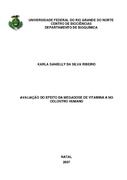Use este identificador para citar ou linkar para este item:
https://repositorio.ufrn.br/handle/123456789/12636| Título: | Avaliação do efeito da megadose de vitamina A no colostro humano |
| Autor(es): | Ribeiro, Karla Danielly da Silva |
| Orientador: | Dimenstein, Roberto |
| Palavras-chave: | Vitamina A;Colostro;Suplementação;Lactantes;Vitamin A;Colostrum;Supplementation;Nursing |
| Data do documento: | 12-Jun-2007 |
| Editor: | Universidade Federal do Rio Grande do Norte |
| Referência: | RIBEIRO, Karla Danielly da Silva. Avaliação do efeito da megadose de vitamina A no colostro humano. 2007. 87 f. Dissertação (Mestrado em Bioquímica; Biologia Molecular) - Universidade Federal do Rio Grande do Norte, Natal, 2007. |
| Resumo: | A suplementação materna de vitamina A no pós-parto é utilizada como medida de intervenção no combate à deficiência de vitamina A. O objetivo deste trabalho foi avaliar o efeito da megadose de vitamina A sobre os níveis de retinol no colostro de puérperas da Maternidade Escola Januário Cicco (MEJC),Natal-RN, assim como analisar a influência do estado nutricional materno na resposta a esta suplementação. O estudo foi do tipo transversal, com participação de 91 parturientes divididas em grupo controle (44 mulheres) e grupo suplementado (47 mulheres). No período da manhã foram coletados sangue e leite (leite 0h). Em seguida uma cápsula de palmitato de retinil (200 000 UI ou 60 mg) foi fornecida às parturientes do grupo suplementado. Outra alíquota de colostro foi obtida após 24h da primeira coleta (leite 24h). O retinol no leite e soro foi quantificado utilizando a Cromatografia Líquida de Alta Eficiência. A ingestão de vitamina A foi avaliada pelo questionário de freqüência de consumo alimentar. Os níveis de retinol sérico nos grupos controle e suplementado foram 35,9 ± 10,6 e 40,6 ± 10,9 µg/dL, respectivamente. As mulheres apresentaram uma satisfatória ingestão média de vitamina A (1492,4 µgRAE/dia), porém com alta prevalência de consumo inadequado (23%). Foram encontrados valores médios de retinol no leite 0 e 24h do grupo controle de 99,1 ± 49,3 µg/dL e 93,5 ± 50,3 µg/dL (p>0,05) respectivamente. Após a suplementação houve um aumento significativo nos níveis de retinol do grupo suplementado, sendo encontrado valores de 102,0 ± 56,0 µg/dL e 196,1 ± 74,0 µg/dL (p<0,0001) para leite de 0 h e 24 h, respectivamente. As parturientes apresentaram diferentes respostas à megadose. Mulheres com níveis deficientes de retinol no leite transferiram mais retinol ao leite 24h do que as com níveis adequados, encontrando um percentual de resposta equivalente a 326,1% e 86,5% de aumento, respectivamente (p< 0,0001). Apesar da aparente normalidade encontrada no soro, as lactantes são consideradas de risco ao desenvolvimento da deficiência de vitamina A, e a megadose foi eficaz nas primeiras 24h após a suplementação e está de acordo com os mecanismos propostos para transferência da vitamina A ao leite |
| Abstract: | The mothers supplementation of vitamin A in the postpartum comes being a measure of intervention sufficiently used in the combat to the vitamin deficiency. The objective of this work was to evaluate the effect of the mother megadose of vitamin A under the levels of retinol in colostrum of postpartum mothers receiving care at the Januário Cicco Maternity School (MEJC), Natal, RN, as well as analyzing the influence of the maternal nutritional status in the reply to this supplementation. The study it was transversal type, with participation of 91 women in labor divided in group had participated of the study have controlled (44 women) and supplemented group (47 women). In the period of the morning blood and milk had been collected (milk 0h). After that a capsule of retinil palmitate of (200 000 UI or 60 mg) was supplied to the supplemented group. Another aliquot of colostro was after gotten 24h of the first collection (milk 24h). Retinol in milk and serum was quantified through the High Pressure Liquid Chromatography. The vitamin ingestion was evaluated by the questionnaire of frequency of alimentary consumption. The levels of serum retinol were 40.6 ± 10.6 and 35.9 ± 10.9 µg/dL in the groups controlled and supplemented, respectively. The women had presented a satisfactory average ingestion of vitamin (1492,4 µgRAE/dia), however with high prevalence of inadequate consumption (23%). Average values of retinol in milk 0h had been found and 24h of 93.5 ± 50.3 µg/dL and 99.1 ± 49.3 µg/dL has the group controlled group, respectively (p>0.05). After the supplementation had a significant increase in the levels of retinol of the supplemented group, being found values of 102.0 ± 56.0 µg/dL and 196.1 ± 74.0 µg/dL for milk 0h and 24h, respectively (p<0.0001). The women in labor presented different answers to the supplementation influenced for the basal levels of retinol in colostrum. It was possible to verify that women with deficient levels of retinol in milk had transferred more retinol to milk 24h than ones with adjusted levels, showing a percentage of reply equivalent to 326.1% and 86.5% of increase, respectively (p< 0.0001). Although the apparent normality found in the serum, the studied women are considered of risk to the development of the vitamin deficiency, and megadose was efficient in first 24h after the supplementation and wakes up with the mechanisms considered for transference of vitamin A to the milk |
| URI: | https://repositorio.ufrn.br/jspui/handle/123456789/12636 |
| Aparece nas coleções: | PPGB - Mestrado em Bioquímica |
Arquivos associados a este item:
| Arquivo | Descrição | Tamanho | Formato | |
|---|---|---|---|---|
| AvaliacaoEfeitoMegadose_Ribeiro_2007.pdf | 879,39 kB | Adobe PDF |  Visualizar/Abrir |
Os itens no repositório estão protegidos por copyright, com todos os direitos reservados, salvo quando é indicado o contrário.

